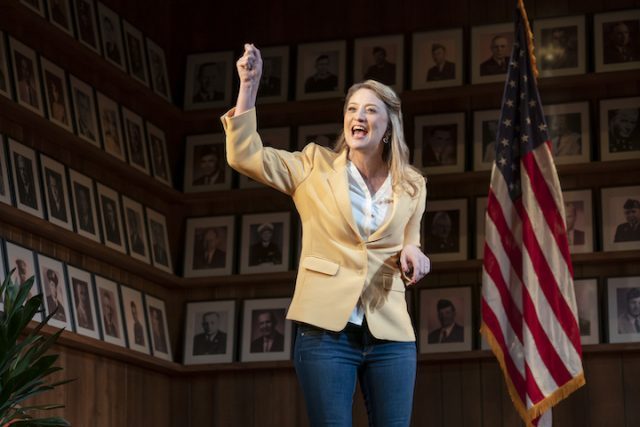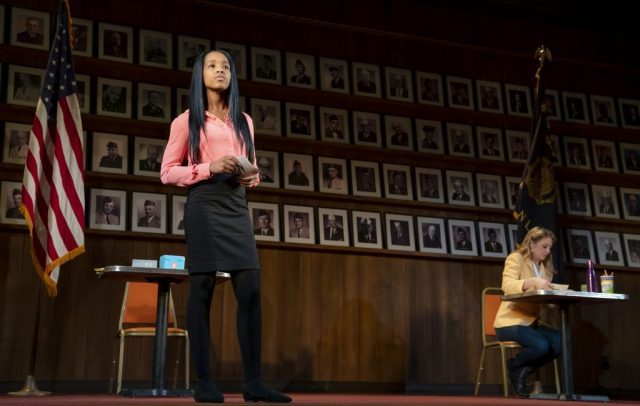
Heidi Schreck examines the US Constitution in Broadway transfer of hit play (photo by Joan Marcus)
Helen Hayes Theater
240 West 44th St. between Broadway & Eighth Ave.
Tuesday – Sunday through July 24, $49-$169
constitutionbroadway.com
The first time I saw Heidi Schreck’s What the Constitution Means to Me, during its run last year at New York Theatre Workshop, it was the day that the Judiciary Committee had voted to advance the nomination of Brett Kavanaugh for Supreme Court Justice to the Senate floor. A somber atmosphere hung over the crowd, which was acknowledged by Schreck, who persevered with hope and humor. The show has now made a wholly successful transfer from the 199-seat NYTW to Broadway, where it is packing them into Second Stage’s 597-seat Helen Hayes Theater. And when I saw it there earlier this month, the foreboding cloud of doom and gloom was gone, replaced by an innate faith that America was going to be okay, as Schreck and the audience were in better spirits, often downright giddy, even as Schreck’s tale goes to dark, intimate places, all the while maintaining a steady focus on exactly “what the Constitution means to me” when “me” is a woman — or anyone except a white man.
In the mid-1980s, Schreck, living in the “abortion-free zone” of Wenatchee, Washington, earned money for college by participating in debates in American Legion Halls about the Constitution. The hundred-minute show re-creates some of those debates, focusing on the Ninth and Fourteenth Amendments, as Brooklyn-based actress, playwright, and television writer Schreck (Grand Concourse, The Consultant) shifts back and forth between her younger self and the woman she is today, able to intelligently face her demons and the mistakes she made, as well as celebrate the triumphs. She is supported by Mike Iveson (The Sound & the Fury, Plenty) as an American Legion Hall moderator and either Thursday Williams or Rosdley Ciprian, high school students who challenge her in a live debate. Rachel Hauck’s set remains intact, consisting of a few chairs and small tables, a central podium, and three sides of a wall displaying more than a hundred framed photographs of legionnaires, uniformly white men in caps. “This hall is not — it’s not a naturalistic representation,” Schreck says. “I got my friend Rachel to help me reconstruct it from my dreams, so I guess it’s like one of those crime victim drawings.” Obie-winning director Oliver Butler (The Amateurs, The Open House) doesn’t make any major changes for the Broadway transfer.

Thursday Williams debates Heidi Schreck in What the Constitution Means to Me (photo by Joan Marcus)
Since I first saw the show at NYTW, there continues to be threats to the Constitution, which Schreck emphasizes “is a living document. That is what is so beautiful about it. It is a living, warmblooded, steamy document.” Using historical facts and personal anecdotes, Schreck connects to the audience while exploring the ramifications of the numerous interpretations of specific rights and liberties, taking on the white patriarchy and honoring the empowerment of women in the country while also delving into hot-button issues. Discussing Clause Four of the Fourteenth Amendment, she explains, “This is the most miraculous clause in our entire Constitution. It says that we all must be treated equally, that we cannot be discriminated against on the basis of race, sex, gender, sexual orientation, religion, ability, or immigration status. It actually uses the word ‘person,’ not ‘citizen.’ Which means that if you are an undocumented immigrant, you must be given all the protections of Clause Three, the due process clause. You cannot be locked up without a fair trial. You cannot have anything — or anyone — seized from you.” Schreck’s innate happiness in talking about the Constitution is infectious; she was so filled with glee that at one point, crossing the stage over to Iveson, she nearly fell onto him; the two of them broke out in laughter, as did the audience. It was one of several spontaneous moments in the show — which is scripted but includes significant room for improvisation — that will have you leaving the theater with a smile on your face even as you worry about how the Constitution is under attack on a nearly daily basis.